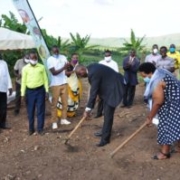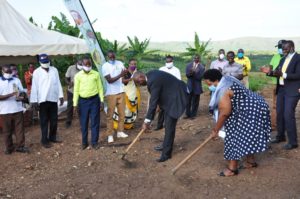Low Arabica Coffee Exports Blamed On Tree Aging
UGANDA – In the recent released report, Uganda’s agriculture skyrocketed as the country registered an increase in coffee export.
During the month of June 2021, Uganda exported a total of 61,838,860 kilograms of coffee valued at US$ 58.56 million at an average weighted price of US$ 1.58 kilo,1cent lower than US$1.59/kilo in May 2021.
Despite the general increase in coffee export, Arabica coffee registered a decline while Robusta increased in quality and quantity.
According to the report, Robusta coffee increased by 63.89% and 72.56% in quantity and value respectively, while Arabica coffee exports decreased in both quantity and value by 29.93% and 23.16% respectively.
The increase of Robusta coffee was attributed to newly planted coffee seedlings during the month of June 2021, after numerous infectious pests and diseases such as Black Coffee Twig Borer (BCTB), Coffee Berry Borers (CBB), Coffee Stem Borer (CSB), Coffee Leaf Rust (CLR), and mealy bugs were reported in Robusta growing areas.
“Increasing Robusta exports during the month compared to the previous year were due to newly planted coffee which started yielding, supported by favorable weather. By the end of May, an accumulative total of 2,815,833 coffee seedlings were distributed for planting under the coffee rehabilitation and renovation programme,” reads part of the report.
The report also indicates that Arabica coffee monthly exports continued to reduce compared to the previous year as a result of the off-year biennial cycle characteristic of Arabica coffee.
Speaking to Asaph Bainomugisha, the Treasurer Nyeibingo Co-operative Society, a cooperative which deals in coffee production in Bushenyi district, Robusta coffee is dominantly grown at lower elevations (<1400m) such as central and northern Uganda while Arabica coffee is predominantly cultivated at higher elevations (>1400m) in parts of eastern, southwest and northwest Uganda, said Bainomugisha.
“Arabica coffee production is low because it is grown in hilly areas and even its demand is low letting the increment to go down. Like in Uganda, it is in Busoga, Kasese and some few parts of Uganda” says Bainomugisha.
He adds that Arabica coffee is also hindered by unfavorable soil properties such as high soil PH and excessive number of shade trees in the East, high soil magnesium concentration and poor mulching systems.
John Nuwagaba, the General Manager Ankole Coffee Producers Cooperative Union (ACPCU), confirmed that areas where Arabica grows well are limited in Uganda while the traditional coffee types keep increasing the population pressure.
Nuwagaba adds that the challenge has been mainly Arabica coffee aging trees that were not affected by coffee wilt disease.
“Because of coffee wilt that attacks mostly Robusta trees, there has been a lot of replanting and less tree replanting on the side of Arabica coffee which is resistant to coffee wilt. This means that Robusta has got more young trees which are more productive than the Arabica areas.”
On the issue of quality, Nuwagaba says that Arabica coffee handling is more sensitive which most farmers have not practiced.
“Like in Kasese, until recently the handling was still poor and this causes a decline in the quality standards of Arabica coffee,” he said.
Nuwagaba adds that the weather changes and disastrous floods like what happened in Kasese destroyed Arabica coffee plantings that resulted into low productivity on the export market.
“In Kasese, floods washed away coffee trees and farmers have limited acreage unless we take Arabica coffee to new areas where we can have varieties that can grow in much lower altitude to boost the production,” Nuwagaba emphasized.
However, Emmanuel Ssenyonga, the General Manager Masaka Cooperative Union says, the union registered an increase in Arabica coffee production at their facility.
“Here at our factory, there was an increase of Arabica coffee by 7% because in Masaka region, it has been its season but I must admit that there has been a deliberate increase in acreage under Robusta coffee and its increase is still going up” says Ssenyonga.
He again attributes the increase in Robusta coffee on better post handling practices by farmers.
“There has been a growing concern on the quality as well because people no longer dry their coffee on the bare ground basing on the going restrictions. In Masaka Cooperative Union, we have been providing tumplines to our farmers where they dry their coffee and several other cooperatives are doing it,” Ssenyonga explained.
https://thecooperator.news/uganda-doubles-increase-in-coffee-exports/
Arabica coffee fetched an average price of US$ 2.62 per kilo, 14 cents higher than in May 2021. The highest price was Mt. Sustainable Arabica, Fully Washed Sipi Falls sold at US$ 5.37 per kilo higher than Washed Robusta sold at an average price of US$ 1.96 per kilo.
“Our buyers do the blending where they get 50% Robusta and 50% Arabica, roast it and grind together to get the blended coffee. But because Arabica is scarce in the market, they put like 40% Robusta from Uganda then 60% Arabica from America or Brazil yet they like coffee coming from the same source, a reason I think why Arabica yields high price in the international market” Yekonia Tumwijeho, the Human Resource Manager(HRM),” ACPCU recommends.
Tumwijeho says despite doing well in Robusta coffee, the union is also advancing to Arabica coffee in the region.
“In Rubirizi and Buhweju, we are going there because we want Arabica coffee since most of our customers are asking for Arabica. Recently we also held a discussion with organizations from Bugisu who have very good Arabica coffee so we intend to tap there since we are not limited by operation so that we can establish a branch by doing the processing and export from that side,” the HRM explains.
On his part, Nuwagaba encouraged farmers in hilly areas to prune their coffee so that they can be motivated on incentives to improve production.
According to UCDA’s report through Uganda Coffee Federations (UCF), Global coffee production for 2020/21 is estimated to increase by 0.3% to 169.5 million bags while the consumption is estimated to increase by 1.9% to 167.24 million bags.
In Uganda, coffee exports are projected to be 650,000 bags as the main harvesting period in greater Masaka and South Western regions is in the months of July 2021.
Buy your copy of theCooperator magazine from one of our countrywide vending points or an e-copy on emag.thecooperator.news
The post Low Arabica Coffee Exports Blamed On Tree Aging appeared first on The Cooperator News.


